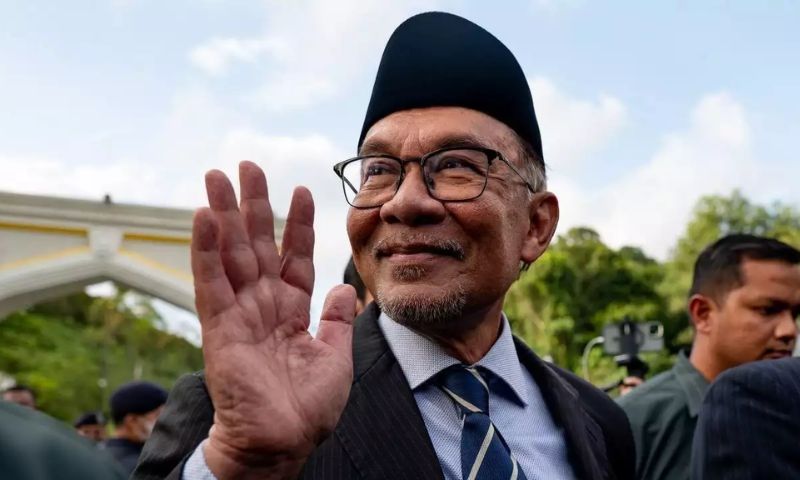KUALA LUMPUR: Malaysian Prime Minister Anwar Ibrahim is set to face a crucial test of support in upcoming state elections, merely a year after assuming office. The elections, scheduled for next month, will witness a clash between Anwar’s government and a formidable Islamic opposition.
Abdul Ghani Salleh, the esteemed chief of the Election Commission, made a significant announcement on Wednesday, divulging that an impressive number of over 9.7 million conscientious voters shall exercise their democratic right by converging at the polling stations on the auspicious day of August 12.
Their noble purpose will be to meticulously elect a remarkable ensemble of 245 astute assemblymen, hailing from a diverse range of six states, forging a collective voice that resonates with the aspirations of the nation.
While state elections typically do not have a direct impact on the federal government, this particular contest will be closely observed as a measure of support for Anwar’s unity government, formed subsequent to a divisive general election in November.
In the previous polls, Anwar’s multiethnic Pakatan Harapan (PH) alliance emerged with the most seats but failed to secure a majority, as a significant number of ethnic Malays rallied behind the Perikatan Nasional (PN) bloc led by former Prime Minister Muhyiddin Yassin. Notably, the PN bloc included the conservative Pan-Malaysian Islamic Party (PAS), which surprisingly rose to become the largest party in Parliament.
Anwar’s ascendancy to the premiership followed his successful bid to secure the support of the once-dominant rival coalition, led by the United Malays National Organization (UMNO) and other smaller parties, to form a unity government. The collaboration between Anwar’s PH and the UMNO-led Barisan Nasional was previously inconceivable in Malaysian politics, where the longstanding rivalry between the two parties had defined the landscape.
Ahmad Fauzi Abdul Hamid, a political science lecturer at the University of Science, Malaysia, noted, “The state elections are the first test of popularity for the unity government on a rather nationwide scale, virtually half of Malaysia. It’ll test whether the people, especially PH and BN’s supporters who have long regarded each other as rivals, welcome such cooperation or not.”
Political instability in Malaysia
The formation of Anwar’s unity government was initiated by the country’s king, who sought to break the deadlock in the hung Parliament and bring stability following a period of political turbulence. Malaysia witnessed three prime ministers in four years leading up to the November elections as lawmakers switched allegiances for political gain.
Anwar’s rise to power marks the culmination of a tumultuous political journey spanning over two decades, alleviating concerns over increased Islamization. His primary challenge lies in consolidating his appeal among ethnic Malays, as many perceive him as too liberal and fear the potential erosion of their Islamic identity and economic privileges under a long-standing affirmative action program. Malays constitute two-thirds of Malaysia’s 33 million people, which also includes substantial ethnic Chinese and Indian minorities.
PAS, which aspires to establish a theocratic state, has intensified racial and religious rhetoric in recent months to expand its influence and demonstrate that the Malay support it garnered in November was not a mere stroke of luck. Previously confined to rural areas, PAS made substantial gains in urban regions, winning 49 out of 222 Parliamentary seats. The party has openly expressed its ambition to topple Anwar by gaining support from government lawmakers.
The upcoming elections will take place in Penang, Selangor (two of Malaysia’s wealthiest states), and Negeri Sembilan, which were previously under Anwar’s PH alliance, as well as in the rural states of Kedah, Kelantan, and Terengganu, ruled by PAS. While most analysts predict the status quo to be maintained in the polls, some speculate that PAS could further dent PH’s hold on the three states.
“If PN were to sweep five or all six state governments, the federal government would immediately become unstable, as many Malay MPs may be enticed to switch their support, potentially leading to the downfall of the Anwar government.























